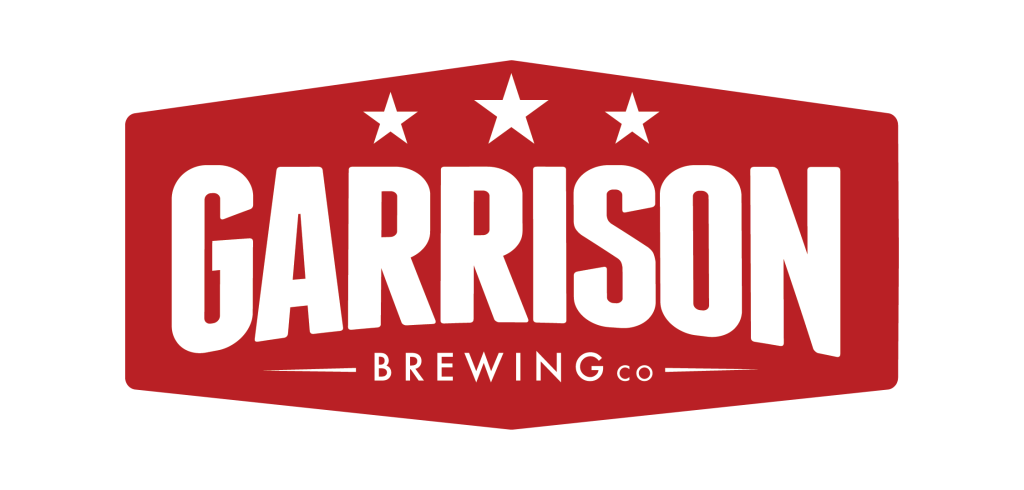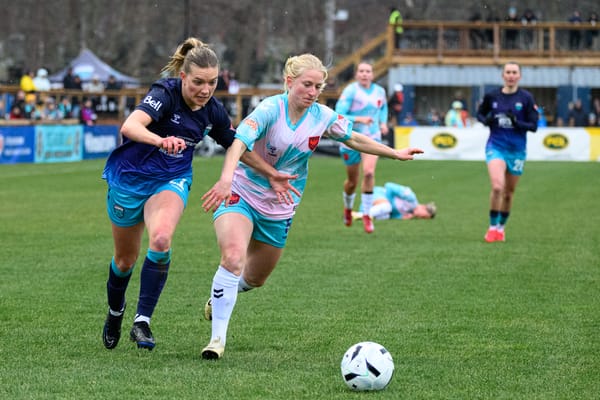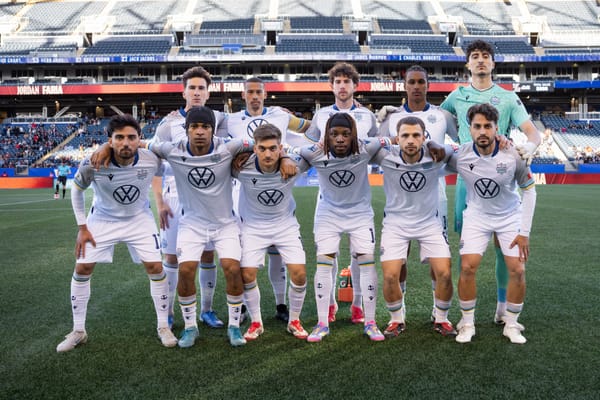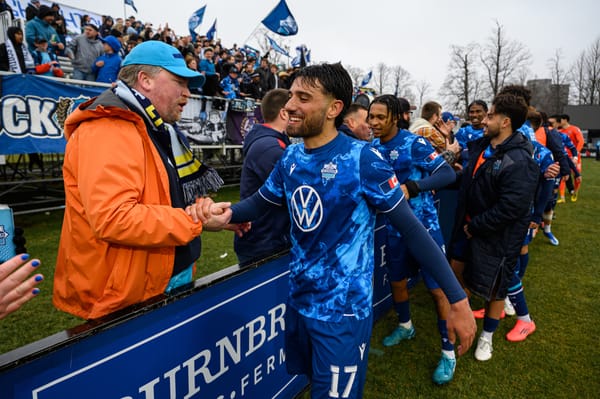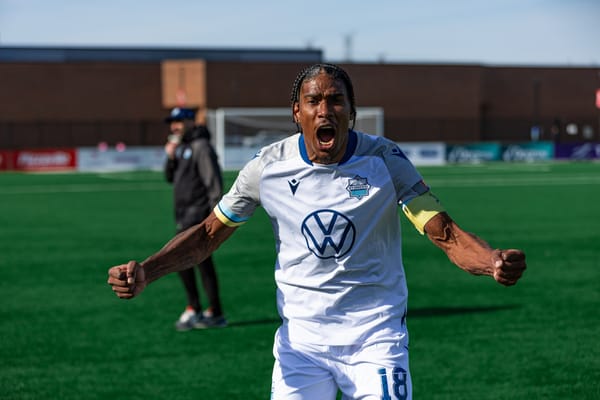End of season availability: Q&A with Halifax Wanderers head coach Patrice Gheisar
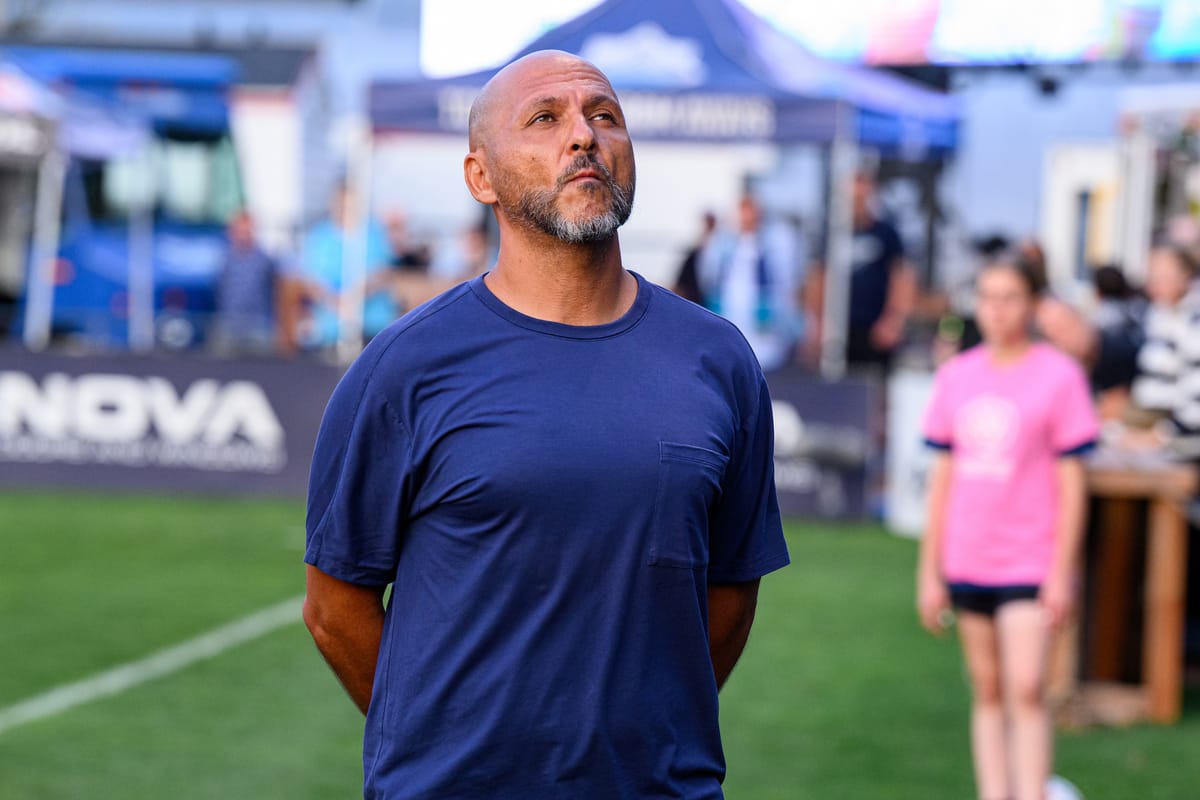
Halifax Wanderers head coach Patrice Gheisar held his end of season media availability on Saturday, with various outlets convening at the club's downtown Sackville Street office.
And although it's only been a week since Halifax's season officially ended, with the club landing sixth on the league table, the off-season is well underway.
Josh Healey, this publication's editor and reporter, spoke with Gheisar for 30-minutes on the past season and his plans for the futures.
JH: Hi Patrice, thanks for doing this. It's almost been a week since the last match of the season. Obviously, the off-season is a time for reflection. What are your feelings on the campaign as a whole having had some time to think about it?
PG: Look, it's kind of that moment of glass half full or glass half empty. I think there are a lot of positives. What we're trying to do now is really do a deep dive to understand everything that happened.
We did create more chances but, perhaps, we needed to do a little bit better with finishing those chances. In defending, we gave up some goals that don't really exemplify who we are. I think 18-yard box to 18 yard box, within that frame, we were as good as last year but we struggled in both boxes. You know, this is not about anything other than identifying what we need to fix for next year. That's the stuff on the field, in regards to play.
But when you look at behaviour, there are things that none of us are proud of. Eight red cards is a record that may not be broken in the CPL and that is not something you want to be known for. I think the misses and the soft goals took its toll and weighed on all of us and people reacted in an unprofessional way, which is inexcusable.
Again, this is not about blame. When it happened to someone, we did support them and talked about correcting actions. You saw in the past stretch (to end the season) that the team was disciplined and committed and kept moving forward. I hate to use the word luck but we didn't get some bounces, we didn't get some calls, and that, again, is something that helps. Those things average themselves out and you have to be mentally strong.
If you go a bit deeper, Josh, breaking down everything and looking at the games. If you look at the numbers, you go, 'Wow, that's interesting.' We were the second best team at home. Clearly, when you're trying to identify what went wrong, we were wasteful in finishing, made a few mistakes in our box, allowed a lack of discipline on the field. But when you go really deep, it comes down to we really struggled away. Last year on the road, we had 14 points and this year we had six. We get those eight points back . . . We more than make the playoffs. Our road struggles were one of the biggest things. But, if I can identify one more thing, all of this escalated because of a really poor start to the season.
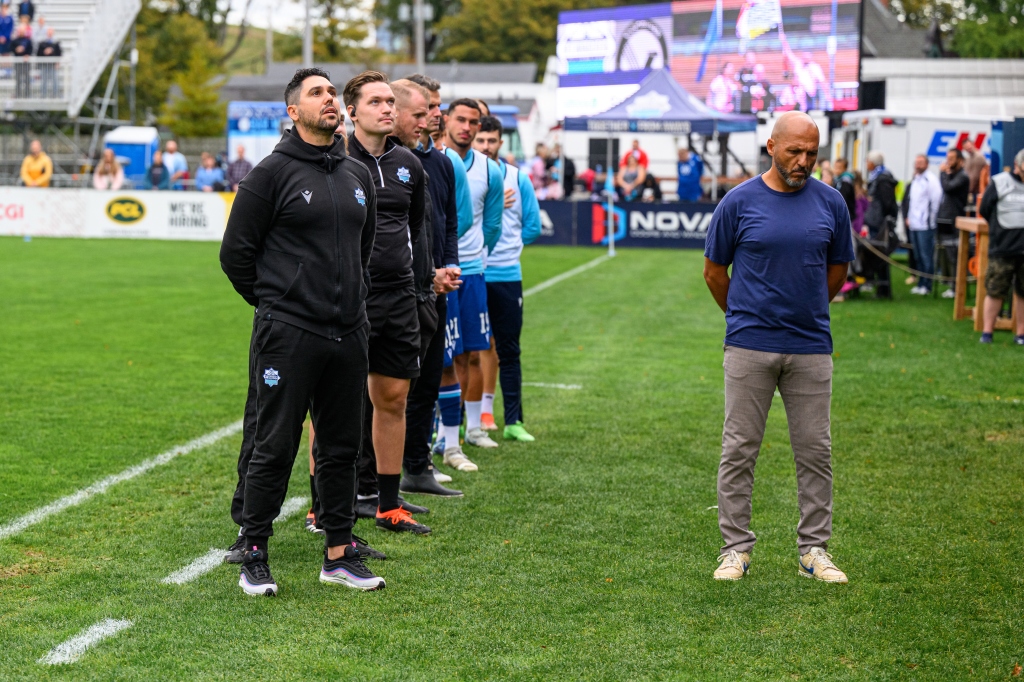
JH: I'm glad you touched on the away form. Even before the season started, going back to training camp, I remember we spoke about how you identified road form last year as an area of improvement. 14 points was the most points the club has ever gotten away from the Wanderers Grounds, a record that you guys established but you still felt you could do better. It's one of the reasons you planned the roving training camp to reduce the travel for those matches against Pacific and Vancouver FC to start the year.
PG: If you get those first two games of the year right, and win, you're already matching the previous year's away wins.
JH: At the time, I asked you how you felt about it and you said: 'I'll let you know afterwards.' Is that training camp-style something you can imagine yourselves doing again to offset the squad inevitably being on the road to start the season?
PG: Listen, Josh, when you're trying to figure out something that's unscripted in the world of sports and the reason that I say that is I've contacted friends in MLS, saying 'Hey how do you deal with this?" Well, they don't have seven hour road trips. We do that four times. We need to dig deeper and I think it's really about finding the right formula.
I think, towards the last part of the season, we ended up one loss in the last nine games. I believe we were excellent in Calgary (on October 12) for the first 60-minutes. We tied at Valour, we tied at Ottawa. We figured out some stuff. It's about what time you go to sleep. What time you wake up. What you eat for breakfast. Really, the smallest details that are helping us.
To go back to your original question, I don't think it worked out — I mean, we lost both games — but what was the cause why it didn't work out? I think we were away from home for too long. But why are we good at home? Clearly, stadium, grass, your own bed, amazing fans. But having your own bed, your own pillows, your own everything. Going away for three weeks before our first two games and sleeping in six different beds didn't work out. The guys were mentally drained, hence the bleeding. We definitely won't be doing that again.
JH: One of the other things that contributed to the slow start must be injuries. I believe every attacking player, at some point, had a knock. I didn't speak to Massimo (Ferrin) yet but I know he had several injuries this year. I remember last year, he had three different injuries. Have you guys been able to figure out why you had so many of your attacking players hurt to start the season? I know you've said Ryan Telfer only played one pre-season game, Christian Volesky didn't play any.
PG: Yeah, (Massimo) had zero and Tiago (Coimbra) had one.
JH: Yeah.
PG: They never really caught their rhythm the first game. I think we really had one game in pre-season, and it was our best game when everyone was available, where we beat Whitecaps II 3-0. Other than that, it was playing guys in positions they don't play just to fill in.
I think there's a lot of different things that contributed. Telfer played over 55 games the previous year, which is insane, because Trinidad & Tobago had a lot more games and he came from Miami. Tiago, it was about managing him but when he was training in the off-season, he still felt the load. And for (Massimo), he was really brave. He played through a lot of pain in October last year and scored in four straight games to end the season. When he went into the off-season, it was about repairing his body and taking care of it. What we didn't want to do was rush them back, which I don't regret, but I'm not sure what we could have done to avoid that. Injuries are injuries. We have no excuses but we should have prepared in a different manner.
JH: You touched on it earlier. This is the second year in a row where you've had a slow start. Obviously, last year, it was quite different. 18 new players, everybody is coming in, you're a brand new coaching staff. I think you had six draws and two losses in the first eight matches, if I remember correctly. But, as you know, this year again you start with two rough ones on the West Coast, you come back here and get knocked out by CS Saint-Laurent in the Canadian Championship. Is there anything you can say about your starts? Two in a row, people are going to say, there's a trend.
PG: We're a team that's trying to get rid of statements like I think and I feel because they're not clear. We watch video, look at the stats and ask what's happening? Clearly, and when I've gone back historically in my career, we're a team that's systematic in possession. It takes time for players to get used to it. Vincent Kompany spoke about his time at Burnley FC where he said it takes 100 practices and 100 video sessions for his team to get results and he had a graph that showed it. I feel it's the same for us. Look at the Giorgio Probo you guys saw in April. Look at Vitor Dias, which I know is different, he was injured. But then look at the guys you saw at the end of the season. We've identified that.
But we can't have a slow start. Our plan will be, no matter who we obtain, who comes back, who we bring as news players, to start the first five games with as many returning players as possible. Last year, we started the first Pacific game with Julian Dunn, Probo, Volesky and Telfer. Next year, we're hoping to reduce that because the returning players understand our game models and slowly, we'll integrate the new players. I'm hoping that turns into results.
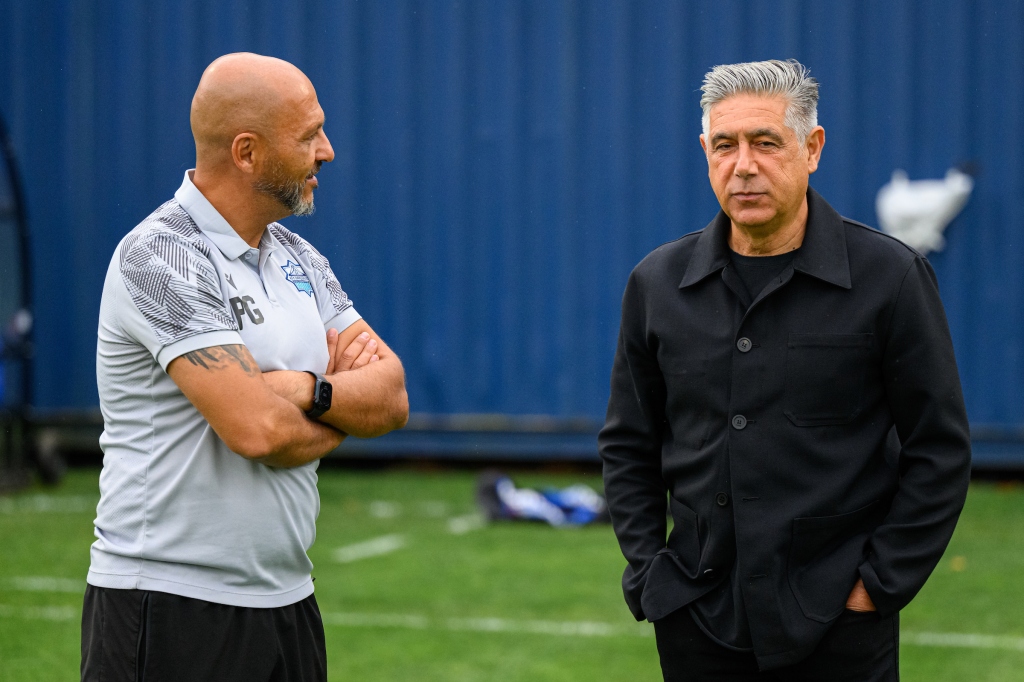
JH: I'm sure you're tired of hearing it but we always talk about U-21 minutes. This year, we also talked about discipline. Your squad was the second youngest in the league. In your opinion, did that show at times?
PG: I don't want to blame our behaviour on that but it also played a part, you can't be naïve. Our team is really stacked in an age group. We're concentrated between 23 to 26-years old. Again, I think that's about us setting a standard and learning from it. I think what you saw in those last few games, was a group that was proud and performing for the fans and acting appropriately. We really learned a lot.
But I think the ultimate dark period was the Pacific game on the road (on September 7). That was a game where we felt the team was really starting to grow and to have that setback was really disappointing. But we've got to own it, we've got to learn from it and not do it twice because that's the definition of insanity.
JH: We've been talking a lot about what went wrong last year. I'd be remiss if I didn't mention what went right. There were some games, some matches, some periods, where the style of football you guys play really shone through. You didn't lose a game at home since mid-May. And you set a match goal record of 4-0 versus Vancouver FC. What are some of the positives that you take?
PG: Look, we set the CPL record twice this year for most shots in a game. I believe the Vancouver game at home, which was 26, and the first game against Pacific, which was 25. In a lot of the statistics which we use to measure our game model, we were top two. We were also first in xG. The game model and our ideas is happening. But what I'm really, really proud of is our team has an identity. If our team played with pinnys, people would say, 'That's the Halifax Wanderers.' People don't need to see the badge on our shirt to identify us. I think that's probably one of the biggest things.
Now, it's about us executing moments, impacting moments. Let's talk about the Pacific game we played at home here (on September 18) with a red card. We were down a man for 75-minutes. You hear these comments about people saying we gave up goals late in the game. Funny enough, we actually led the league in goals scored from the 75th minute to the 90th. We scored the most goals, which I believe was 11 for the season. We finished games better and were creating chances.
Another thing is I'm really excited by our recruiting. You're starting to see it more and more. I think Nassim Mekidèche was a great addition. I think Sean Rea was a great addition. Both will get better. I think Telfer was a great addition. I think Probo was a really great addition. And I think Vitor Dias, the moments he gave, were magic, amongst others. I think some of the other individuals had some injuries and their best is to come, like Kareem Sow. Overall, I think our recruiting was good and we created chances but were short on execution.
If I could attach the negative to the positive, we've just got to manage individual moments. It's like in the 88th minute, where Pacific cross in the ball with us up 2-1, manage that and you win that game 2-1 playing with a man down.
But the most positive thing, for me, is the way we finished the season. Everybody had a chance to say, 'I quit.' Everybody had a chance to rollover to play dead. But I don't think anyone can say that. In our last 10 games, excluding the Pacific night, our team gave an effort. We pushed. We tried. And we fought. It worked out sometimes, sometimes it didn't.
JH: Fair enough. Something I'll mention is the league's never been closer. On the last day, Valour could have made the playoffs or they could have ended up with the Wooden Spoon.
Something else I wanted to touch on, now that we've talked about the recruitment, is that change is inevitable in football, especially when you don't get the results you want. Many players are on options, be it Ferrin, Cale Loughrey or Aidan Daniels. But some of the core players are out of contract completely: Dan Nimick, Lorenzo Callegari, Zachary Fernandez and Yann Fillion. What can you say about conversations with those players and what the future holds? I know it was a different year for them. I know Lorenzo was named the club's Player of the Year for a second year in a row. But for Dan, he had a very good first half of the season but had some own goals and red cards that maybe left a sour taste in the second. Where are you at with these guys?
PG: Firstly, I'm grateful for every single one of them. What they've done for me, the organization and the club, I couldn't have asked for more. I think it's really important to recognize their magical moments. No one's perfect. I think Dan was inspirational all of last year and most of this season. He shouldn't be defined by one or two setbacks. Or Zach. Or Yann. I think they are some of the best at their positions. I'd never turn my back on those guys because they fought so hard.
But change is inevitable and sometimes, necessary. Obviously, we have to go through our roster depth and there's a very aggressive salary cap and we have to manage that. And they also have to make decisions. I mean, it hurts, Josh, but wouldn't we like to see any of those four guys go to play at a higher level? That's part of our job. For sure, we want to win to make the city and the fans proud but part of our evolution is to help these guys go to the next step and prepare them.
Long answer short, it's unknown. We have to assess our options, they have to assess their options. We would love to retain a lot of them because I also don't think we need massive change. Every stat we've shared shows we just need to manage moments, not bring in a new team.
JH: With that said, can you maybe share some positions or profiles of players you're looking to bring in or address? Last year, I remember you said, given the youth of the team, you wanted to get some veteran players. You wanted someone to mentor Coimbra. What can you share for this coming off-season?
PG: It's funny that you remembered all of that because we got all of them. We got Telfer, we got Jérémy (Gagnon-Laparé), we got Volesky to help Tiago and had some other complimentary No. 10s for our system. Obviously, a lot of our plans depend on our free agents and what they decide. If Zach moves on, then we will need a full-back. I think it's too early to tell right now because we need to see what their decisions are.
But most importantly, one of the things we do want to obtain is an experienced veteran that can bring additional leadership to us, to steer away from us blaming anything other than ourselves and really, really underlining discipline and getting away from any red cards. I don't think we had a red card in 2023, did we?
JH: Not that I remember.
PG: That's crazy. Anyways, that'll be one of our targets for sure.
JH: Not to dig up the past but sometimes, watching from the press box, you see guys get excited. You mentioned that Pacific match where you guys got two red cards. To me, that's the type of match where if you had a Doneil Henry on the bench telling them to keep calm, maybe it goes a different way.
PG: 100 per cent. Look, the true compliment of an elite leader is you just make everybody better. We had a lot of great leaders. I'm grateful for Andre Rampersad, amongst others, but to continue to support that is an important task.
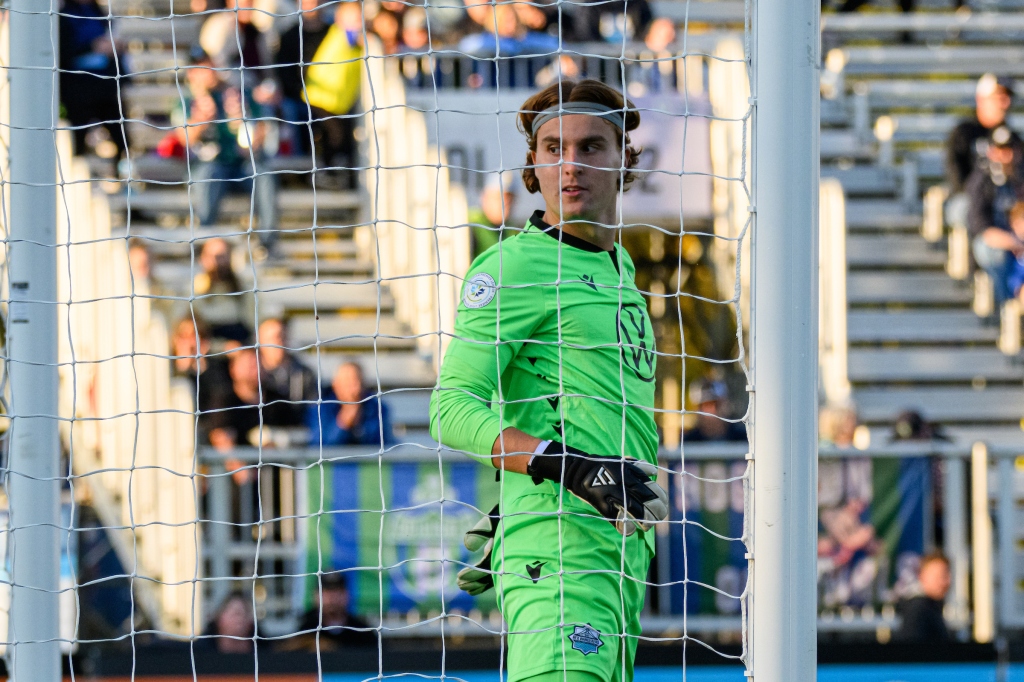
JH: Only two more questions from me. The last match of the season, you saw Coimbra score a big goal. We saw Tavio Ciccarelli make his debut. And Aiden Rushenas got his first professional win. Can you talk about the development of your young players, some of whom have been with you for two years. How in the mix will they be in for next year?
PG: I spoke about this after the Pacific game and I'm, you know, in love with these wonderful questions about U-21s. I continue to ask what is it about these U-21s that you want to see? Is it the minutes so you can take a deep breath and feel better about yourself? No problem. We'll do that first game of the season. We'll play everybody and then never play them again.
Or, we can put more thought into it. Aiden Rushenas never played any games last year. He never complained, continued to work hard. Was he ready (last year)? Maybe, maybe not. He didn't play any games to start this season. But his work didn't deteriorate and his relationship with Yann (Fillion) and Jan-Michael (Williams) was at his highest. And when he went in, he was ready. Now, he's had two years as a U-21 under me. Now, the true tests comes: will he stay on and get the contract? We'll find out and we're discussing that. I think he's been fantastic.
I think the true role of a U-21 player is for a coach to prepare them to get a contract after their U-21 tenure is over. I think Tiago is still a U-21 and we're hoping to increase his role. I think Tiago was unavailable for 12 games this season, which is something we don't want to see next year. We want him to have a bigger and bigger role and stay on the field. I think the preparation for that starts today. And I think Tavio and Camilo (Vasconelos) gave us glimpses but they're young. Some guys grow more rapidly than others and some have a peak and a drop, a peak and a drop. All we can do is support them and stick by them.
JH: Okay, that's all the questions I have for you, Patrice. Is there anything you'd like to add that we didn't discuss?
PG: Yeah, I think when you talk about the home form: what is the magic of the home form? I think part of that has to do with the players' comfort because we eat at the same restaurant, you drive through the same streets. But part of it has to do with our fans. A large, large part of it has to do with our fans because they create this excitement and at the same time, our opposition is intimidated. I can't stress how important they are to us, how much we appreciate them. I think the only thing I can guarantee is we continue to outwork our opponent.
We talked about the plan I had for the first two years, and we spoke about it earlier, and it was to be the most attractive football team in the league and to develop a clear game model. I think we're there, we're one of the top two most attractive teams to watch in my opinion, I'm biased, but now the next task is we want to be the hardest team to beat. That takes grit, determination and passion and I think we have that. Now, it's about taking that big step and executing.
But we can't do it without the fans. We ask that they continue to support us and what we do, we want to share these beautiful moments with them. It's no different than being an artist who does great paintings but doesn't have anyone to share them with. I think all these great moments — from the 3-0 win over Forge, or Dan's penalty in 99th minute, or (Tomas) Giraldo's goal in the 95th minute against Ottawa at the final whistle — are great moments. But they're great because we shared them with the city. We hope we can continue going with that and we hope next year is the year we can give them what they deserve.
JH: Thank you for your time.
PG: Thank you, sir.
Editor's Note: This interview has been condensed and edited for clarity.
Further reading:
- Wanderers end 2024 with a win. But now, with a long off-season ahead, the real work — and post-mortem — begins.
- Injuries have hampered Tiago Coimbra’s sophomore season. But with two matches left, he’s ready to embrace the Wanderers’ biggest challenges yet.
- HEALEY: The Halifax Wanderers were eliminated on Saturday. But it’s not the squad that played at ATCO Field that lost them their playoff spot.
Cover Photo Credit: Trevor MacMillan / Halifax Wanderers FC
